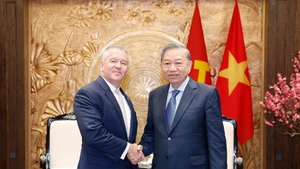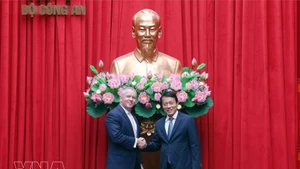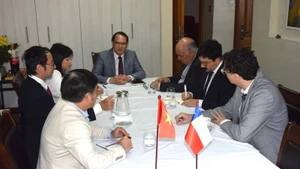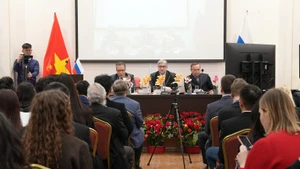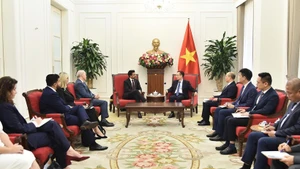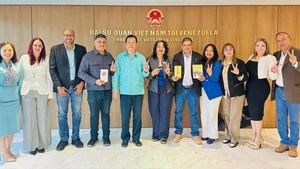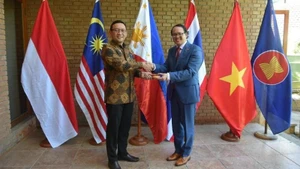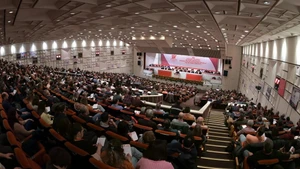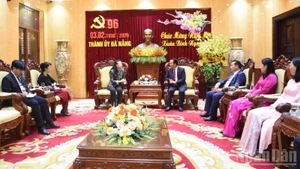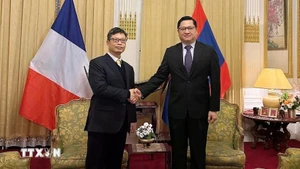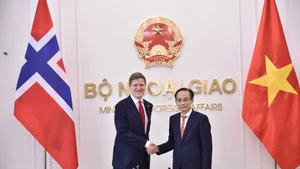Never before has the boundary between “protecting security” and “safeguarding freedom” been so fragile. Cyberspace, where people connect, communicate, and create, has become a new “living space” for humanity, but also an invisible battleground of information, data, and control.
The Ha Noi Convention, therefore, is not merely an international legal document. It is also a powerful statement on human rights, ethics, and the emerging global digital order, reflecting the shared aspiration to build a safe, humane, and just cyberspace where technology serves humanity, not dominates it.
Foundation of digital order
Cybersecurity is no longer confined to protecting devices, systems, or data. It encompasses the protection of national sovereignty, economic security, cultural identity, and human dignity in the digital realm.
In an age of sweeping digital transformation, every aspect of life, from governance, economy, education, and healthcare to communication, relies on technology. Cybersecurity thus stands as a “shield” safeguarding order, stability, and sustainable national development in cyberspace.
The Ha Noi Convention marks not only a legal milestone but also Viet Nam’s declaration to the world of its proactive, humane, and responsible approach to global cyber governance. As technology expands human freedoms while simultaneously rendering them more vulnerable than ever, the Convention represents a necessary step toward a new digital order founded on respect for humanity, digital sovereignty, and collective security.
It establishes a new set of international norms for data protection, information security, and the fight against transnational cybercrime, reaffirming the shared responsibility of states, international organisations, technology corporations, and individual users to build a “safe, transparent, and human-centred cyberspace.”
Specifically, the Convention emphasises three fundamental pillars: data protection and information integrity – ensuring the security and authenticity of personal data, preventing its misuse for commercial or political purposes; prevention and combat of transnational cybercrime – fostering international cooperation in investigation, prosecution, and intelligence sharing; shared responsibility of governments and technology actors – upholding the dual principle of promoting innovation while protecting legitimate rights and freedoms in cyberspace.
The Party’s policy affirms that advancing digital transformation must go hand in hand with ensuring cybersecurity and safety - a fundamental condition for Viet Nam’s breakthrough in the new era. The documents of the 13th National Party Congress clearly state: Viet Nam must proactively adapt to the Fourth Industrial Revolution, build a digital economy and society, while safeguarding cybersecurity as an indispensable element of national digital sovereignty.
Cybersecurity, therefore, forms the foundation of the digital order, where technology serves not only development, but also humanity, human rights, and social stability. Security in cyberspace is not a “barrier” to freedom; it is the very condition that allows freedom to be exercised safely, responsibly, and sustainably.
Human Rights – Central standard of digital transformation
In recent years, violations of privacy, excessive surveillance, misuse of facial recognition and behavioural data analysis have become as global concerns.
Artificial intelligence and algorithmic recommendation systems now have the power to shape users’ thoughts, beliefs, and even emotions.
Cyberspace, once envisioned as a free and equal environment, has become a mirror reflecting both the light and the shadows of humanity, where a single malicious comment or false piece of information can destroy reputations and lives.
Even more worrying, fake news, hate speech, and cyberbullying are inflicting serious harm on human rights, particularly among vulnerable groups such as women, children, persons with disabilities, and ethnic minorities. Victims often lack effective protection mechanisms, while technology platforms tend to prioritise profit and traffic over social responsibility.
This reality calls for a global legal and ethical framework for cyberspace — a vision that resonates deeply with President Ho Chi Minh’s humanistic philosophy, which always placed people at the centre of all policies.
From the earliest days of independence, President Ho Chi Minh affirmed: “Independence is meaningless if the people do not enjoy freedom and happiness.” He regarded human rights as sacred values and the foundation of all political and legal institutions.
The first Constitution of 1946, drafted under his leadership, enshrined the guarantee of citizens’ democratic freedoms as one of its core principles. That spirit has illuminated the nation’s constitutional and legislative development for nearly eight decades. Today, it is continued and elevated in the Ha Noi Convention, as Viet Nam and the international community together affirm a new truth of the digital age: protecting cybersecurity must go hand in hand with protecting human rights.
From Ho Chi Minh’s humanist thought to the spirit of the Ha Noi Convention, there runs a consistent philosophy of developing for the people, by the people, and because of the people. Human rights in the digital age can only be protected when technology is guided by ethics, law, and compassion. Only then can digital transformation truly embody humanity, and cyberspace become a realm for human flourishing, not a space where humans are reduced to data.
Building new values in cyberspace
In the vibrant current of the digital era, Viet Nam is emerging not only as an active participant in global integration but also as a shaper of new values in cyber governance. From the 2018 Cybersecurity Law and the 2024 Personal Data Protection Law to the National Digital Transformation Strategy (Vision 2045), Viet Nam has been building a coherent, modern, and human-centred legal framework — balancing two core values: national security and human rights in the digital environment.
Safeguarding human rights is inseparable from protecting national interests, under the principle that security is the condition of freedom, and freedom is the measure of security. Guided by President Ho Chi Minh’s humanist legacy, the Communist Party of Viet Nam has consistently upheld the philosophy: “All for the people, for their freedom, happiness, and comprehensive development in harmony between the individual, the community, society, and nature.”
This reflects both a humanistic philosophy and a practical vision for sustainable development in the technological age. The Party’s orientation, advancing digital transformation together with cybersecurity and safety, demonstrates profound awareness that true freedom cannot exist in a chaotic, insecure, or lawless cyberspace.
Viet Nam has continually refined its institutional and legal framework to promote socialist democracy and ensure that citizens’ rights and obligations are effectively protected.
The 2013 constitution further clarified these principles, which have since been operationalised through key legislation, including the law on Access to Information, the law on Children, the law on Gender Equality, and new provisions on data protection and cyber information security.
In this process, Viet Nam not only safeguards its national interests but also contributes responsibly to global digital order. The proposal and promotion of the Hanoi Convention on Cybersecurity and Human Rights mark a regional and international breakthrough, reflecting the leadership of a developing nation with strategic vision and capacity to shape new international norms.
The Convention is viewed as a framework for international cooperation towards a “green, clean, and humane cyberspace,” where technology serves transparency, trust, and fairness.
With a vision that digital transformation must be accompanied by transformation in awareness, and that technological progress must advance human progress, Viet Nam is demonstrating its ability to shape norms, mediate values, and balance global interests in this complex and evolving domain.
From the principle “for the people,” to a comprehensive system of laws, policies, and international initiatives, Viet Nam is not only protecting national interests but also helping to define a distinctly Asian - Vietnamese approach to digital human rights - one that places humanity at the centre of development, and technology at the service of freedom and happiness.
Thus, the Ha Noi Convention is not only a landmark in international law but also a manifestation of Viet Nam’s intellectual depth, strategic vision, and aspiration for responsible, sustainable global integration.
In a rapidly changing world order, maintaining balance between cybersecurity and human rights means upholding the identity of an independent, sovereign, civilised, and humane nation. It is the path Viet Nam steadfastly pursues, placing humanity at the heart of progress, and progress at the service of humanity.

